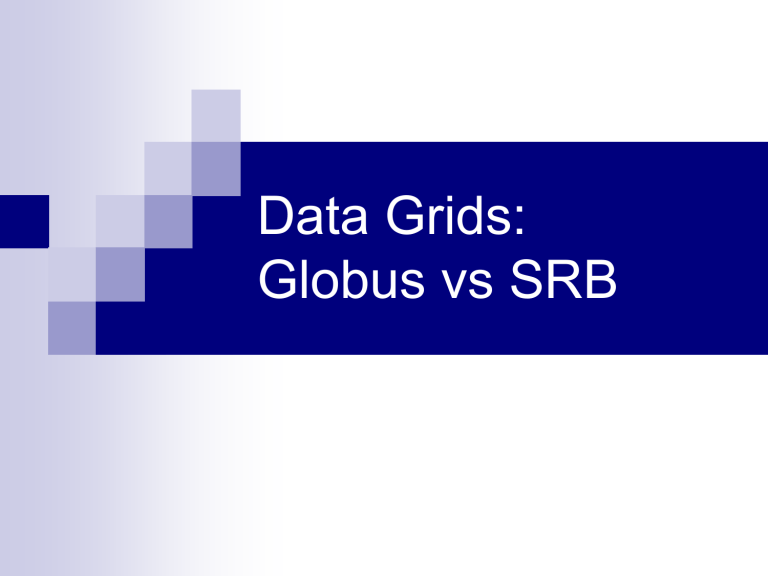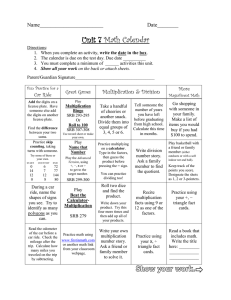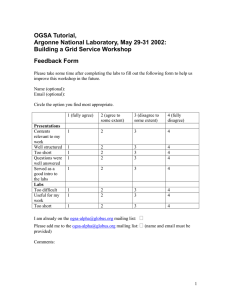Data Grids: Globus vs SRB

Data Grids:
Globus vs SRB
Maturity
SRB
Older code base
Widely accepted across multiple communities
Core components are tightly integrated
Globus
Data transfer components stable
Control, web service protocols are in flux
Optional value-added components have varying levels of stability
Interoperability
SRB
Proprietary data and control protocol
Limited documentation available
Many language bindings
Globus
Standards based protocols
GGF
Grid-ftp
OGSI, WSRF
Common underlying communications protocol
Components are modular and can be mixed together in often arbitrary ways
Ease of use
SRB
GUI and command line clients available
All developed clients must use provided tools
Simplified central administration
Globus
Custom clients need to be designed.
Multiple entry points, so clients need not be aware of complete system
Each component has separate administration module
Cost
SRB
Free software
Easy setup for simple installations
High cost to extend core functionality
Ease of developing clients through multiple tools
Ease of user access through supplied tools
Globus
Free software
Complex setup of multiple disjoint components
Easier to extend core functionality using standard protocols
Clients may be complex due to multiple components
User access is up to grid developer
Custom portals, registry services
Target Audiences
SRB
Data access, preservation, management groups
Groups requiring ease of multiple datasets across administrative and technological boundaries
Limited to no internal data transformation requirements
Globus
Computing and service based needs
Data components designed to feed into other services and usually not directly accessible to end users
Data exposed as a service
Support
SRB
Single point of contact for support
Mailing lists, bug tracking, online manuals http://www.sdsc.edu/srb
Occasional tutorials at
SDSC
Globus
Multiple support groups depending on number of components used
From the Globus Alliance and the Globus community
Manuals, Mailing lists, online tutorials
Numerous seminars and tutorials around the world http://www.globus.org
Commercial support forthcoming (IBM, HP)
Component Comparison: Security
SRB
Clear text passwords,
GSI authentication
Central authorization
Complete separation between underlying operating system and
SRB
Globus
GSI authentication
Authorization depends on local sites and individual components
Commonly just map
GSI entities to local system users
Component Comparison: Data
Access
SRB
Srbmasters provide srb specific data moving protocol
MCAT tracks all available data holdings on srbmasters
Tight coupling, all available data MUST be registered in MCAT
Globus
Gridftp provides extended ftp services
(striping, GSI authentication, etc)
Data locating handled through RLS
Not tightly coupled to gridftp
Component Comparison: Data
Discovery
SRB
MCAT stores metadata system and descriptive centrally
Can be queried using SQLlike syntax
Database pass-throughs can be registered and directly queried with limited output transformation
Globus
MCS can track limited descriptive metadata
OGSI-DAI can provide 3 rd party access to existing data sources
Not tightly coupled to underlying data on ftp services
Sepeaation between system and descriptive
Component Comparison:
Processing
SRB
Limited remote execution
Must be registered in
MCAT and application installed on srbmaster
Cannot execute arbitrary code
Globus
Easy to design add on services as web service
Can tie into existing compute resources
In hpc manner, many components can execute arbitrary jobs
Lessons Learned
SRB
The SRB can easily handle textual metadata.
Extended metadata support requires extensive code modification
SRB needs to be treated as an end to end data grid and not as individual components
Globus
Globus is flexible, but also complicated
Some Globus components are fragile (MCS, RFT) while others are very solid and reliable (GSI interfaces, GridFTP)
Globus is evolving and improving: the implementation was made much better with subsequent toolkit releases




